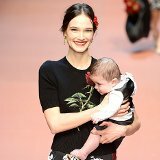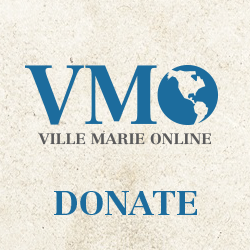
Mom's the Word
|
"Bravo Dolce & Gabanna!" - for speaking the truth: a child needs a mother. |
 |
by Deborah Rankin
It isn't often that we have the opportunity to talk about why mothers are important in a child's life, despite the fact that there is a truckload of research on the topic in the natural sciences. Common sense dictates no less. Haven't we all seen mother cats lavish care on their kittens, the very same felines who feign indifference to their human companions? Even the friendliest mother dog will growl menacingly at anyone she thinks might threaten her pups.
Of course, in today's knowledge-based environment, we don't have to rely solely on observation or intuition. By now, many of us will have a bit more of an informed view about why the female of the human species is so devoted to her newborn despite the sleep-deprivation, lack of sex and personal time that go hand-in-glove with being a new mom.
We've probably heard that mothers get a big dose of the hormone oxytocin while giving birth, facilitating labour and breastfeeding. This so-called "love-hormone" also helps them to bond to their little (often howling) tykes once the ordeal of giving birth has subsided. We may have heard that baby is biologically wired to bond to mommy too, sniffing out the milk in her breasts, the beat of their own tiny heart, no less than the rythmn of their every delicate breath occuring in sync with hers, a process known as symbiosis which begins in the pre-natal period.
Well, we all missed a golden opportunity to talk about the universal truth of the maternal-infant love connection, but two fashion designers did a good job of trying. Renowned fashion designers Domenico Dolce and Stefano Gabbana, known for their innovative, yet classic clothes with Mediterranean flare by "fashionistas" around the globe, were pilloried in the press for stating the obvious: a child needs a mother as well as a father.
Dolce said, "Procreation must be an act of love," adding, "You are born to a mother and a father - or at least that's how it should be." Gabanna spoke candidly about his feelings for his own mother, "A child needs a mother and a father. I could not imagine my childhood without my mother. I also believe that it is cruel to take a baby away from its mother."
A recent headline in Montreal's The Gazette was typical of many, "Anti-gay comments spark call for Dolce & Gabbana boycott." The article was referring to a call to arms by Sir Elton John for a boycott of the Dolce & Gabbana fashion label following an interview the two gave to an Italian magazine in which they said," We oppose gay adoptions. The only family is the traditional one."
Margaret Somerville, who holds the Samuel Gale Chair in Law at McGill University, as well as a professorship in the university's Faculty of Medicine, finds thinking such as Sir Elton's surreal. She has long been a staunch supporter of children's rights to know where they came from: "I propose that the most fundamental human right of all is a child's right to be born from natural biological origins and that children also have human rights with respect to knowing who their biological parents and families are, and that these rights must be recognized."
Gabbana also emphasized the child's right to belong to a natural kinship group: "The family is not a fad. In it there is a supernatural sense of belonging."
But the pair reserved their strongest criticisms for the use of reproductive technologies in creating same-sex families: "No chemical offsprings and rented uterus: life has a natural flow, there are things that should not be changed," they said. "I call children of chemistry 'synthetic children'. Rented uterus, semen chosen from a catalogue," Dolce said.
John, who has two children by a "surrogate" - a euphemism for the birthing mother - with his partner David Furnish slammed their views as "judgemental" and "archaic" stating, "Your archaic thinking is out of step with the times, just like your fashions. I shall never wear Dolce and Gabbana ever again #Boycott Dolce & Gabbana. " The D & G designing pair were quick to respond launching their own Twitter hashtag urging people to boycott Elton John's music and concerts.
John's remarks about Dolce & Gabanna's clothing line were more than a little ironic for the pop music icon has never been known for his sartorial elegance. He has cultivated an extravagant persona onstage by wearing elaborate glittering costumes to total bling effect. Offstage he has consolidated this offbeat image by dressing flamboyantly, habitually sporting his signature over-sized glasses.
He did get one thing right though: motherhood is "archaic", if by this one means any of the various dictionary definitions of the word i.e. antiquated, primitive, and going back to the earliest periods in culture. Western iconography of the Madonna & Child (Mary and Jesus) is testament to a ubiquitous worldview reflecting the sacrosanct bond of all mothers and children.
The war of words between the celebrities highlights the fault-lines in the gay community, often portrayed as being cut from one cloth. Neo-traditionalist gays like Dolce and Gabanna - a romantic couple for 23 years before they split up in 2005 - recognize that some things should not be changed even if it is technically feasible. The Biblical injunction to "honour they mother", as well as the father, isn't to be trifled with.
On the other side of the divide are gay iconoclasts like John who want to use medical technology to re-jig human life and re-map human culture. They either don't understand or simply refuse to recognize that motherhood isn't merely a social construct. It is rooted in a child's innate needs for feminine nurturance.
The advent of birthing mammals in zoological history, producing a new breed of mothers keenly attuned to the needs of their young after birth, is recognized as a turning point in the evolution of species. And the maternal-child bond becomes more important as living beings move up the evolutionary chain, not less so.
This becomes evident when you look at the science of maternal-infant bonding, particularly in relation to what happens when Mom isn't in the picture. Scientists like Alan Shore of UCLA's David Geffen School of Medicine refer to this phenomenon as "mother-absenteeism".
Brain research that Shore and other neuroscientists conducted shows that infants who don't attach to their mothers in the first year of life are prone to develop a host of cognitive and emotional problems, as well as difficulties with motor skills. Other research shows that separation from the birth mother causes anxiety- remember Sigmund Freud and "separation-anxiety"? - weakening the immune system and setting the stage for future illness.
Of course children are primed to connect to their fathers, too, through their mothers, a neuro-biological feedback loop that Shore calls "man-woman-infant bio-rythmicity". Dad's role is pivotal in a child's social development. Brain research shows that infants who don't attach to their fathers in the second year of life are more likely to have poor impulse control and exhibit anti-social behaviour later on.
For children born to gay male parents through third-party conception, the use of reproductive technologies poses additional risks. Today, most surrogate mothers are gestational surrogates, meaning that the child has another genetic female parent or egg donor. This process of assembly-line reproduction involves separating genetics from gestation.
Not only are the children raised by gay male couples deprived of a mother's love, they often don't have what every animal born in the wild takes for granted: one biological mother. This puts them at risk of developing aneuploidy, a condition characterized by an abnormal number of chromosomes.
All children born through the use of reproductive technologies are at increased risk of developing multiple health problems, as well as premature death. So, the designers weren't spewing out anti-gay rhetoric for the sake of knocking off a professional rival in sounding the alarm about the dangers of "designer babies".
Their message is deceptively simple: people and products aren't the same and society shouldn't be endorsing socio-medical experiments in the conception, design, and parenthood of children.
These individuals are all indisputably creative giants in their respective fields. However, the realm of haute couture that has propelled Dolce and Gabbana to great heights is a light universe away from the world of popular music that Elton John has dominated for decades. So why has there been all this kerfuffle about what they had to say?
Dolce and Gabbana's comments struck a nerve precisely because they exposed the pseudo-love cult that underlies the disregard for children's (blood) filiation and genetic identity rights and the lack of clear enforcement mechanisms to protect them. Children born through reproductive technologies have the same human rights as others under the UN Convention on the Rights of the Child - which Canada not only signed, but actively promoted - to be connected to their natural parents, living relatives, and ancestors.
It doesn't follow that because a child has been conceived in-vitro or because one of their biological parents is gay that there is any right to cut off their access to the other biological parent, much less erase the child's genetic identity.
Yet, this is being done and the authorities are complicit. A case in point which made national headlines last year involves a gay male couple getting a judge to sign off on removing the birth mother's name from the birth certificate, something which was never done before.
No one ever heard the phrase "adoption rights" before it was prefaced by the word "gay". The legal basis for adoption is the "best interests" of the child - not the wishes of adults. However, it has become commonplace to speak of giving gays the same (non-existent) rights to adopt as heterosexuals.
Gay-male parent activists have brazenly lobbied the UN Human Rights Committee to take children away from single mothers, asserting that they have rights to acquire other's people's children simply because they can now marry. However, heterosexual marriage was never packaged with a right to adopt.
Perhaps the most absurd claim that gay male parent activists have made is that there is a "gay male parent advantage". This is another leap of logic, to put it mildly. The notion that gay men are better suited to nurture and raise an infant is strongly contradicted by well documented facts about the pivotal role of the mother in a child's life.
These developments point to an entitlement mentality among many gay-parent activists to remove children from their families of origins in order to create families of their own design. So, it is more than a happy coincidence that two well-known fashion designers have spoken out about this issue in such unequivocal terms.
Of course, the warring celebs eventually offered each other pro forma apologies to protect their respective brands, but that doesn't negate the merits of Dolce and Gabanna's statements in support of motherhood and children's natural rights to be connected to their mothers. So, let's thank them heartily. "Bravo, Dolce & Gabanna!"- for speaking the truth and generating a buzz on this crucial topic.
For a continuation of the discussion on EthikaPolitika, click here.
Last Night at the Gayete

|
|
|
|
|
|
The Centaur Theatre's - season is drawing to a close with its final production of Last Night at the Gayety, a musical comedy by Bowser & Blue which runs until May 22nd. |
|
|


